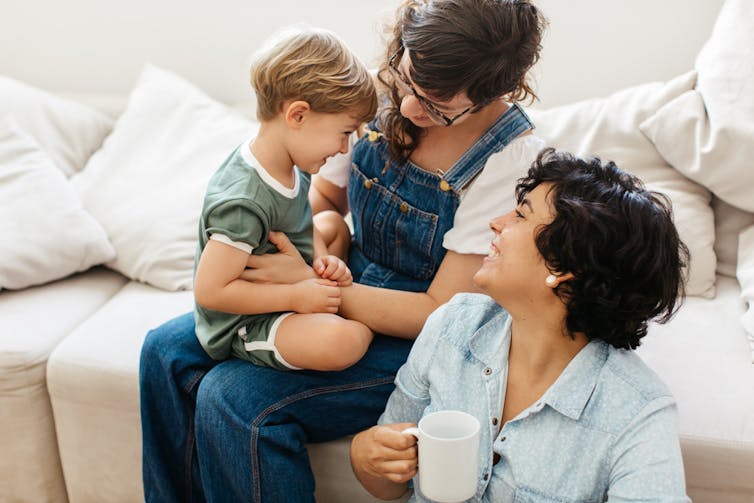Stigma around same-sex marriage affected Australians’ health. Here’s what happened in your electorate
- Written by The Conversation

Community-level opposition to marriage equality and the stress that came with it is still making some Australians in same-sex relationships sick years after the vote, our study suggests.
In research published today in the American Journal of Public Health, we show people in same-sex relationships living in areas more strongly opposed to marriage equality had higher rates of chronic health problems after the vote compared to those living in areas with less opposition.
There were, for example, more long-term heart, respiratory and mental health conditions in people in same-sex relationships in areas with the most opposition to marriage equality.
Our study is the first to show the link between opposition to marriage equality and health in this way.
It’s also a reminder of how underlying community attitudes can magnify stigma, which can have long-term consequences for people’s health.
What we did
We used two main sets of data in our study. One was from the 2017 marriage equality postal vote, which gave us a measure of the opposition to same-sex marriage in each electorate. Although we couldn’t see how individuals voted, the data gave us a percentage “no” vote per electorate.
The other data came from the 2021 census, the first year Australians were asked about their long-term health conditions, such as asthma, heart disease, and mental health conditions, such as depression and anxiety. The census data covered the health of Australians in same-sex and different-sex relationships.
We then mapped the two to show the link between opposition to marriage equality and people’s health four years after the vote.
What we found
As community-level opposition to marriage equality increased, long-term health conditions were more common among Australians in same-sex relationships compared with those in different-sex relationships.
In areas with the lowest opposition to marriage equality (about a 13-26% “no” vote), individuals in same-sex relationships had a 56% higher odds of reporting any long-term health condition compared to individuals in different-sex relationships.
But in the areas with highest opposition (about a 34-56% “no” vote), this increased to 63%.
The health of young people, men, and people living in areas with more socioeconomic disadvantage was particularly affected. These same-sex couples were among those with higher rates of mental health, respiratory and heart-related conditions. All of these have been strongly linked to stress.
These effects remained even after controlling for other factors that could impact health, such as age, income and education.
This suggests community-level attitudes – in this case votes against marriage equality – are likely to represent stigma towards sexual minorities.
How does stigma affect health?
International studies show sexual minorities living in more stigmatising environments are more likely to experience stressors due to their sexual orientation. This includes harassment or bullying.
In more stigmatising environments, sexual minorities are also more likely to turn to risky behaviour, such as smoking and drinking to help “cope” with these stressors. The larger effects we see for lung, mental health and other stress-related conditions supports this theory.
A lack of inclusive health care or past experiences of discrimination (in health care or more broadly) could also deter sexual minorities from accessing necessary health care.
Previous research has shown lesbian, gay and bisexual Australians living in areas with higher opposition to marriage equality use less preventive and primary health care (such as seeing a GP) than their counterparts living in areas with less opposition.
So overall, we can say delayed access to preventative health care and heightened social stressors could lead to deterioration of health and eventually the development of long-term conditions.
Such chronic conditions can be costly for the health system. This means the health disparities we’ve highlighted are not only a human rights issue, but also an economic one.
What can we do?
Unfortunately, discrimination against sexual minorities remains widespread in Australia.
For instance, religious organisations can still discriminate against LGBTQ+ students and staff. Conversion practices, which try to change or suppress someone’s sexuality or gender identity are still legal in some states and territories.
Structural discrimination could also impact access to health care for sexual minorities. For example, in more stigmatising regions, sexual minorities may be less willing to disclose their sexual orientation to health care providers due to fear of discrimination.
Disclosure is essential because it leads to better outcomes, including improved quality and continuity of care.
Finding inclusive health care might also be more difficult in regions with higher stigma, and harder still in areas with few health care options.
So we need to urgently invest in inclusive and responsive health care. The federal government has committed to a ten-year action plan for LGBTQ+ health and wellbeing. But we also need funding for LGBTQ+ community-controlled health organisations. These could help support sexual minorities to access necessary and valuable culturally appropriate health care.
In particular, our research suggest resources should be targeted to areas with higher opposition to marriage equality and young people living in more socioeconomically disadvantaged regions.
We need more data
Our research only explores health inequities for Australians in same-sex relationships. We cannot draw any conclusions about the health of non-partnered sexual minorities nor any effects among the broader LGBTQ+ community. We just don’t have reliable, comprehensive data.
So we support recent calls for better and more inclusive data collection on sexual orientation and gender identity, including in the 2026 census.
Better data would allow us to pinpoint which policies and interventions can reduce stigma and, in turn, reduce the health inequalities sexual minorities in Australia face.
We would like to thank Ian Down from LGBTIQ+ Health Australia for his feedback on this article.
If this article has raised issues for you, or if you’re concerned about someone you know, anonymous and free peer support is available through QLife (ph: 1800 184 527). A list of services and supports is also available via LGBTIQ+ Health Australia.







